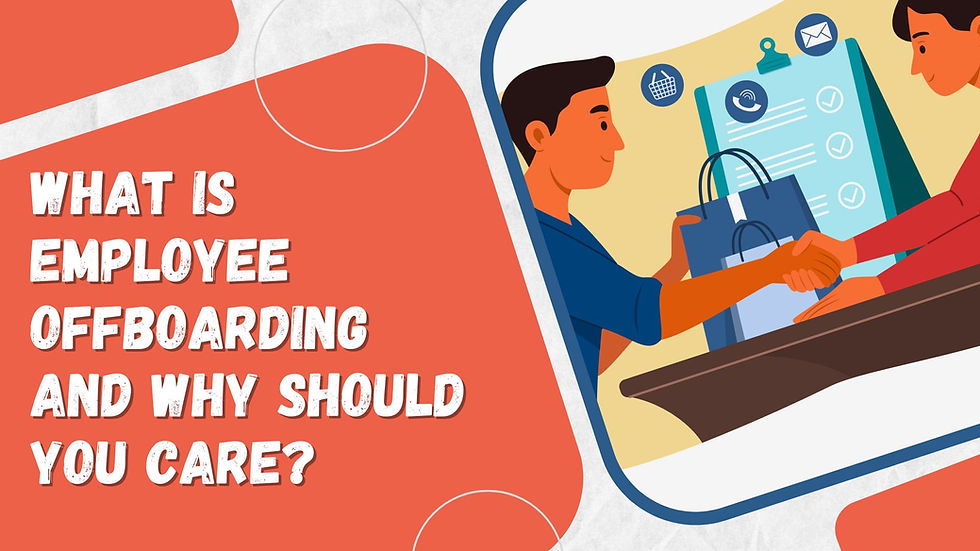What Is Employee Offboarding And Why Should You Care?
- sussaana54522
- Jul 24, 2025
- 3 min read

Ever wondered what really happens when an employee leaves your company? Is it just a matter of collecting their ID badge and cutting off system access? Think again. Poorly managed exits can lead to security risks, loss of knowledge, and damaged employer branding. That's where employee offboarding comes in.
Whether employees leave voluntarily or involuntarily, how you handle their departure says a lot about your company and has lasting consequences.
Why Is Employee Offboarding Important?
A well-run offboarding process offers more than just ticking boxes. It helps:
Protect company data and assets
Maintain positive relationships with former employees
Gather insights through exit interviews
Ensure smoother transitions for teams
Boost your reputation as a respectful and organized employer
Now that hybrid and remote work models dominate, ignoring structured offboarding can create serious blind spots both technically and culturally.
Key Steps to an Effective Offboarding Process
Here’s how you can streamline offboarding and make it work for everyone involved:
1. Create a Formal Offboarding Checklist
Have a documented workflow that covers every step. This ensures consistency across departments and minimizes missed tasks.
Checklist items might include:
Final payroll and benefits processing
Retrieval of equipment (laptops, phones, badges)
Efficient Human resource management
Revoking access to tools and systems
Transferring projects and knowledge
Conducting a detailed exit interview
2. Communicate the Exit Clearly
Let the relevant team members know about the departure with professionalism. Transparency reduces confusion and keeps the work environment stable.
3. Knowledge Transfer

Before someone leaves, ensure all their critical tasks and knowledge are passed on. This could include:
Project documentation
Client handovers
Internal workforce management
4. Secure Data and IT Access
It’s essential to shut off digital access right at the time of departure. In today’s data-sensitive world, a delay can create serious cybersecurity vulnerabilities.
5. Conduct a Respectful Exit Interview
This is your chance to get honest feedback. Make it non-judgmental and confidential to gain genuine insights that can improve retention.
The Long-Term Value of Proper Offboarding

When done right, offboarding isn’t just about exit logistics it’s a gateway to long-term employer reputation. Ex-employees talk. They leave reviews, refer talent, or even return in the future (boomerang employees). A respectful exit can become a recruitment tool.
Moreover, thoughtful offboarding reinforces trust across the organization. It shows current employees that they’ll be treated with professionalism — right to the very end.
What Tools Can Help With Offboarding?
To make your process seamless and compliant, consider using software tools tailored for HR workflows. These tools can automate tasks like:
Email notifications
Access removals
Documentation collection
Survey distribution
Popular HR platforms like BambooHR, Zenefits, or Sapling offer integrated offboarding features that reduce manual errors and save time.
You can also watch;- EmpCloud: One Platform for All Your Workforce Needs!
Summary
Employee offboarding is more than a polite goodbye. It’s a critical HR function that protects company assets, reinforces culture, and builds brand credibility. When approached strategically, it helps maintain continuity, ensures compliance, and supports a positive employee experience even after someone leaves.
FAQs on Employee Offboarding
Q: When should the offboarding process begin?
A: It should start as soon as an employee’s departure is confirmed, giving HR, IT, and managers enough time to plan.
Q: What’s the difference between onboarding and offboarding?
A: Onboarding welcomes and integrates new hires. Offboarding ensures smooth exits and data protection when someone leaves.
Q: Is offboarding needed for contractors or freelancers?
A: Yes. While it might be shorter, contractors should still return equipment and lose system access.
Q: Can exit interviews really make a difference?
A: Absolutely. They provide critical feedback that can uncover internal issues and improve retention strategies.

Comments